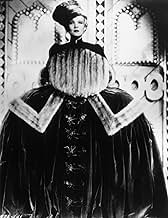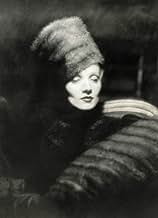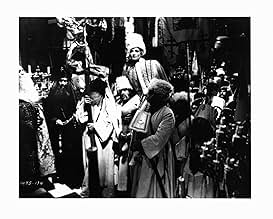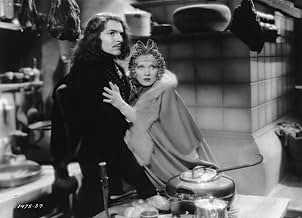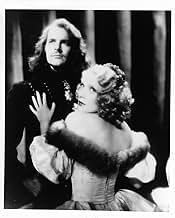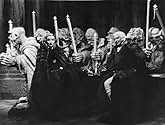Uma nobre alemã entra em um casamento sem amor com o herdeiro estúpido e instável do trono russo, então conspira para tirá-lo do poder.Uma nobre alemã entra em um casamento sem amor com o herdeiro estúpido e instável do trono russo, então conspira para tirá-lo do poder.Uma nobre alemã entra em um casamento sem amor com o herdeiro estúpido e instável do trono russo, então conspira para tirá-lo do poder.
- Direção
- Roteiristas
- Artistas
- Prêmios
- 1 vitória no total
- Count Lestoq
- (as Phillip Sleeman)
- Ivan Shuvolov
- (as Hans von Twardowski)
- Sophia as a Child
- (as Maria)
- Lackey #5
- (não creditado)
- Count von Breummer
- (não creditado)
- Sophia's Aunt
- (não creditado)
- Direção
- Roteiristas
- Elenco e equipe completos
- Produção, bilheteria e muito mais no IMDbPro
Avaliações em destaque
In the first half Marlene Dietrich in the title role overplays breathless awe so emphatically that one can only wonder if she was strictly directed to do so; after her sexual awakening after months of resisting the stirring of her passions by a rakish courtier (John Lodge) and crazed with frustration by her unconsummated marriage to the repellent Tsar-to-be Peter (Sam Jaffe), she melts into the arms of a palace guard during a sudden moonlit encounter.
It's hard to believe this film passed the 1934 censors, given its open suggestions of out-of-wedlock sex (and subsequent pregnancy); Dietrich's posturings call to mind pre-Code Mae West (who was a friendly acquaintance of Dietrich's on the Paramount lot where they were working at the same time). Perhaps the keepers of the Code were too distracted by the shimmering vision of the blonde icon as lit by Josef von Sternberg. And make no mistake about it, this movie is a paean to Dietrich as a work of art. The "Catherine the Great" plot, scenic design and supporting players are the scaffolding and trappings supporting and surrounding the living goddess.
These trappings are highly stylized and elaborate as, for example, the Lubitsch-like ritual of Princess Sophia (the future Empress Catherine) kissing the hands of all adults present whenever she enters or exits a room; when she isn't engaged in strictly supervised activities she is kept locked in her bedroom several flights above the main floor of her house; her mother is such a disciplinarian that she scolds the child even when the child obeys. Empress Elizabeth of Russia (Louise Dresser) is introduced on a grand throne in forbidding surroundings decorated with huge grimacing gargoyles festooned with dripping candles and attended by over-dressed lackeys, only to open her mouth and jabber like a bilious small-minded housewife. And the future Tsar Peter whom Sophia is sent to Russia to marry is an imbecile and described as such repeatedly in intertitles in case we miss the point.
In fact the flow of exaggerations and extremes is more or less constant so that the viewer is alternately hypnotized and amused. If Dietrich is not your cup of tea, the movie will repel you, because it's all about her.
This was a movie about excess as much as anything, curtains that go on forever, huge doors, loud music, etc. They just don't make them like this anymore and certainly couldn't afford to then, either.
I don't think I ever saw Marlene anymore sensual than in this film, and I agree, her idea of playing a 'poor innocent gal'-that isn't put across well at all. Sometimes you just can't fake it, no matter how hard you try.
*** outta ****, style over everything.
The whole of the Russian court turns out to be not much different from the vile stories of atrocity she was narrated to as a child, one after another a series of machinations at the hands of the half-mad.
But of course history was never the purpose for Sternberg, these stories at the beginning of the film he visualizes in the manner of pages from a book. So a fiction malformed from history, a book of images, ostensibly based on the diaries of the real person, in turn a history malformed from the real thing, with Dietrich stage center, shining, radiant.
It was always Dietrich that validated film for Sternberg, the image of seductive beauty that could seduce beauty from the camera. But in several ways, I feel that Sternberg deteriorated upon joining up with her much like the hapless professor in Blue Angel. His art was tortured before, anguished with emotion, but since Dietrich it seemed to be solely consumed by her at the expense of all else.
Nowhere is this more evident than here, no pretense about it anymore. Dietrich is quite literally queen, destined to be, and the whole thing around her merely provides the tortured circumstances for the scene of triumph.
There is so much cacophony when she does finally triumph that it makes you think Sternberg has finally gone unhinged from so much pained adoration, that he doesn't quite know when to separate one feverish fantasy from his own. A cavalcade storms inside the palace and up the expansive staircase, a bell rings, ringing bells across the country, crowds rejoice, that were earlier silently praying, and Dietrich is finally ushered on shoulders into the church swarmed with banners on all sides to be crowned empress. Ride of the Valkyries clangs away in bombast for the duration.
But this is the thing that strikes the most vividly, the crowning luxurious decadence of the whole enterprise. Even in the grip of what seems like lovestruck paroxysm, Sternberg could envision farther than most at the time. And when he failed, he failed more spectacularly than anyone could, in the most interesting ways to see.
It baffles. It exhilarates with the sheer monstrosity of the caricature. It overwhelms any sensibility that is fine, any sense of good taste. You will never see more a outrageous depiction of an Orthodox church ever, the frescoes of saints bordering on a surreal that is blasphemous. Or more styrofoam gargoyles in one studio lot palace.
So the frame is overflowing with anguished, fiendish luxury; but everything that is grossly portrayed here, was actually taking place on that studio lot. Whatever was going on in 18th century Russia, at least this thing was actually happening in Hollywood, that would go to such lengths to envision and stage such a dazzling darkness. A cavalcade was made to storm up a staircase. And there was this woman at the center, flickering before the camera like the flame of the candle she holds at one scene, finally lighting up the place.
So it is apt to recast the whole thing as Dietrich's journey, mirrored from the other, from her faraway home into the court of a foreign country, with every spotlight on her, every male pair of eyes.
The first part is sourced out as a kind of Alice in Wonderland; the girl enters a strange world, apprehensive, fearful, a world that would reduce her to size, where she must fit through doors too big, wait for the queen or lose her head, finally descend into a rabbit hole and come out the other end the mother of a heir.
But in the second part she becomes the Dietrich we know and have come to see conquer with fierce beauty, the Lola that first broke hearts in Blue Angel; the whole film around her transforms into the restless dream that men were dreaming about her. The idea is that she becomes that dream, operating the image from inside.
It is not a good film all else considered, the overcooked bombast, the intertitles that never shy away from revealing the full implications of the most obvious detail, but it's a mess you should see, just for how madly passionate.
Você sabia?
- CuriosidadesMarlene Dietrich's own daughter Maria Riva portrayed young Sophia at the beginning of the film and it was her debut in movies.
- Erros de gravaçãoMost of the action takes place at The Kremlin in Moscow. The historical Empress Elizabeth, Grand Duke Peter and later Catherine spent most of their reigns in St. Petersburg, which during the 18th Century was a modern, Europeanized city.
- Citações
Grand Duke Peter: Why are those bells ringing?
[He opens the bedroom door and addresses a man in the hall]
Grand Duke Peter: Why are those bells ringing?
Capt. Gregori Orloff: I don't know, Peter.
Grand Duke Peter: How dare you address me like that! Who are you?
Capt. Gregori Orloff: My name is Orloff, and I'm on duty as guard.
Grand Duke Peter: I'll have your head for this insolence! You're addressing the emperor!
Capt. Gregori Orloff: There is no emperor. There is only an empress.
- ConexõesEdited from Alta Traição (1928)
- Trilhas sonorasSymphony No.4 in F Minor, Op.36
Written by Pyotr Ilyich Tchaikovsky
Excerpts played during the opening credits and incorporated into the score often
Principais escolhas
- How long is The Scarlet Empress?Fornecido pela Alexa
Detalhes
- Data de lançamento
- País de origem
- Idioma
- Também conhecido como
- A Imperatriz Galante
- Locações de filme
- Empresa de produção
- Consulte mais créditos da empresa na IMDbPro
Bilheteria
- Orçamento
- US$ 900.000 (estimativa)
- Faturamento bruto mundial
- US$ 3.353
- Tempo de duração
- 1 h 44 min(104 min)
- Cor
- Proporção
- 1.37 : 1


